May 31, 2007
Wine or beer?
Har, har, an article in Slate about brews titled "Beer in Headlights." Shoulda been called "Beer is Flat." Thomas Friedman-like, Slate's Field Maloney takes 1,700 words to say what we already know instinctively: wine's a drink for elitist snobs, beer's for real men. Wine is "aspirational," beer is practical. The current Henry Weinhard (*) campaign puts it bluntly: beer tastes better than soy milk. Well, duh.
Beer's great, no doubt about it. Thirst-quenching, satisfying in ways wine can never be. Most wine people love beer.
But here's the problem: beer has always been popular because of its predictability. A Bud while you're mowing the lawn in Laurelhurst (assuming you mow your own lawn, probably won't happen if you live in Laurelhurst) is going to taste the same as the one you swig at the Safe...or Shea Stadium. A Bud's a Bud, and the production folks at Anheuser Busch spend a fortune making sure that one Bud tastes like all Buds.
So why is wine getting more cred than beer? Read on.
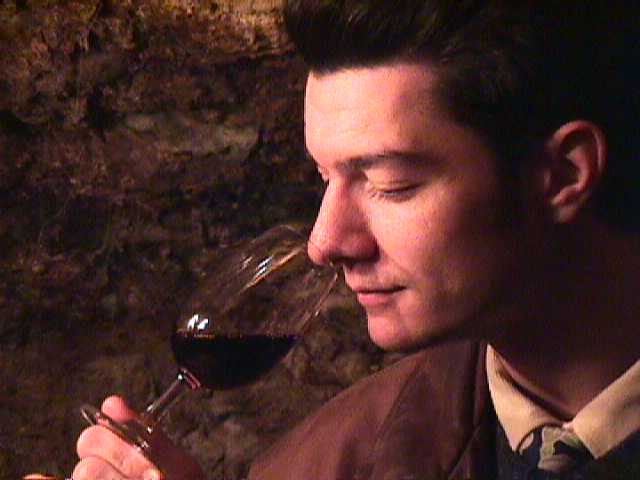
A pretentious wine connoisseur will expound on differences (grape variety, national origin, soil conditions, weather), but most of today's wine drinkers are attracted by the predictability of certain flavors. They associate the name "Chardonnay" not with a grape variety from Burgundy (where, in fact, there are dozens of different soil conditions) but with a beverage whose flavor has become familiar comforting, like a brand of toothpaste.
What percentage of wine drinkers are “flavor-driven”? Hard to say. But here's the best part, for folks who actually care about wine: the rising tide of popularity floats all barrels. Everywhere you go, there's better wine, better-made wine and more interesting wine, because the industry has a new base of support.
And even as the purists bemoan the globalization and Parkerization of wine, the tendency to make fine wine for the preferences of a specific critic and for competitions where bigger flavors mean better medals, there's a backlash that values subtlety and uniqueness.
So what's unique? French beer, for example. We're fans of the brews from Alsace, in eastern France. There's a brand called Meteor that they flavor with a shot of bitters, Picon Amer, makes it taste almost like a dark ale, with a touch of sweetness.
On the wine side, whites in general get little respect...kinda like beer, no? Current favorite is the zingy, grassy sauvignon blanc from New Zealand, though it's not in danger of becoming the new chardonnay. Other whites from northern Italy (as long as it's not pinot grigio) and Sicily have terrific appeal. On the red side, cabernet franc from the Loire Valley makes for wine that's great with food. Wines from Georgia (the country, not the state), the birthplace of the
Aspire all you want, wine snobs! Once again, Cornichon finds itself living in the best of both worlds. Craft beers like Manny's, brewed in a Georgetown warehouse. Craft wineries like Willis Hall, vinified in John Bell's garage in Everett. We are happy travelers indeed, and we don't even have to travel far.
(*) Aspirational Ditty
'Enry's life was all frustration,
Never could improve his station.
For 'Enry was a lazy bloke,
It showed whenever 'Enry spoke:
'E lacked the proper haspiration.
May 30, 2007
Kiddie food
Folklife, Sasquatch, Bite, Bumberpalooza, the fests and feasts just keep coming. Elephant ears, brats, shishkaberries, deep fried desserts. Don't know whether to laugh, cry or reach for the Maalox.
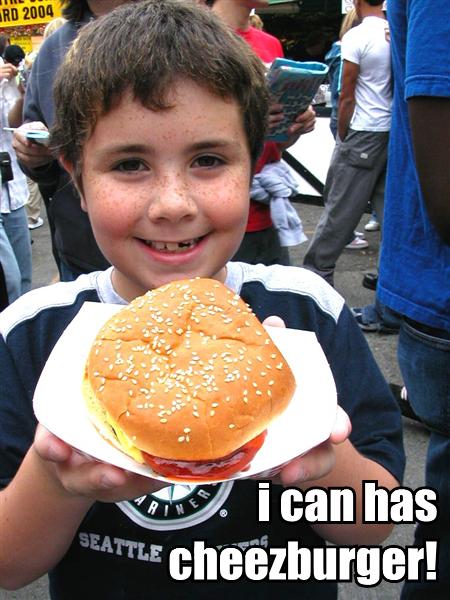
May 29, 2007
Wine weekend
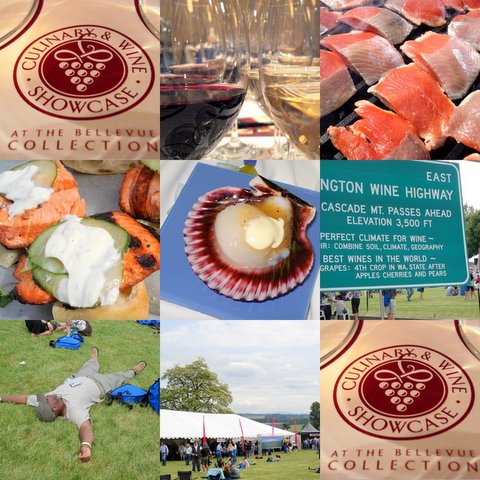
Destination marketing: it's Patrick McFarlan's specialty. Happens that he's employed by Willows Lodge in Woodinville; that doesn't stop him from marketing Washington's distant vineyards. As president of the Woodinville Chamber of Commerce last year, he spearheaded an event called the Washington Wine Highway, held again this past weekend on the lawn at Chateau Ste. Michelle.
Food, drink, and roadsigns that let you pretend you were in Yakima or Walla Walla without having to spend hours and hours on the Interstate. They told the food vendors to expect 1,500 at each booth, but the hot tickets, like Elliott's Copper River salmon filets and 0/8 Seafood's scallop sashimi, served 2,000 portions on Saturday alone.
Numbers not as high back at The Bellevue Collection (high-end shopping in and around Bellevue Square), which piggybacked onto the weekend with a lower-key promotion of wine dinners and tastings. Not quite as focused, perhaps, on the simple pleasures of eating, drinking and snoozing on the grass.
Death penalty
Larceny pays, if you're the ceo. Should you get caught with your hand in the company till (or fingering your back-dated stock options), you might have to submit to the indignity of a perp walk but the stockholders pay your legal fees and the odds are you won't do a day in the pokey. (Get busted for stealing a loaf of bread, on the other hand, and it's hard time for sure.) But what penalty awaits those who abuse public trust?
In this country, there's always a convenient underling to take the fall for huge public scandals. It's part of the job description, as in "Goat, comma, scape."
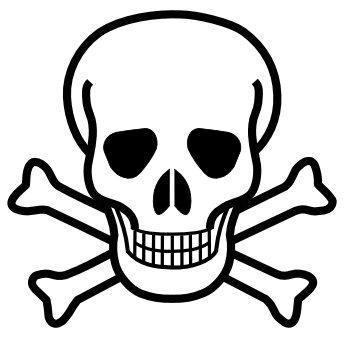
So what a welcome surprise to see two developments from across the Pacific. In Japan, the agriculture minister committed suicide rather than face questioning in a corruption scandal. And in China, the official in charge of drug safety has actually been sentenced to death.
Can you imagine anything like that here? "Heck of a job, Brownie" would take on a whole new dimension.
May 24, 2007
Copper is still gold
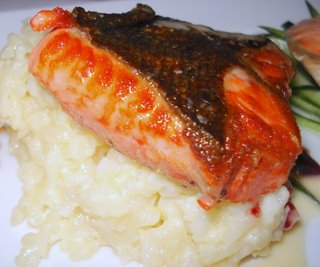
Wasn't that long ago, matey, we'd be lucky to see any fresh salmon in Seattle. Bristol Bay had a huge sockeye fishery, the largest in the world, but the catch was frozen stiff before it made it to local markets. Now, we're spoiled silly, with fresh, wild salmon coming in from the mouths of rivers all along the Alaska coast: the Yukon, the Taku, the Stikine and, best of all, the Copper.
The folks at McCormick & Schmick are doing their darndest to promote the spring runs, enlisting an anthropomorphic "Wild Salmon" band (Sockeye Sam on vocals, King Karuthers on keyboard, Kenny Keta on bass, etc.), reminding diners about the health benefits of Omega-3 fatty acids and tweaking the twice-daily fresh sheet to highlight the runs.
At a media dinner this week, sous-chef Josh Westcott sent out a succession of delectable salmon dishes. A tartare made with Taku red and Stikine ivory was stunning (especially paired with a Willamette Valley Vineyards pinot gris). The highlight, though, was grilled Copper River atop plain risotto. Sure, the other salmon were wonderful, coming from recently reopened fisheries at the mouth of long, fast-running rivers. They might be cheaper, too, but that's not the point; we live close to the source, we pay for the privilege of first crack at the Coppers.
Executive chef Eric Naruszewicz, whose previous assignment was in Boston, singled out Paul Tourangeau's Koike Seafoods for supplying small batches of high-quality fish, no mean feat when demand is high and the P-I's substitute restaurant writer surveys local eateries serving overhyped, overpriced and, gulp, undercooked fish.
So as we head into the wild salmon season, let's pause and give thanks. Bless Jon Rowley, who first called Seattle's attention to the Copper River run. Bless the salmon, of course. And bless those who call it "center-of-the-plate protein," as long as they cook it right: till it flakes.
Puttin' on the poutine
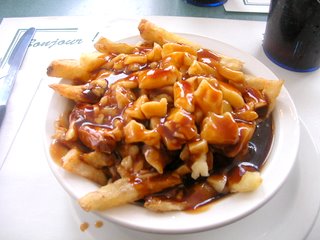
Montreal and Seattle versions of poutine
When will they learn, those pretentious New Yawk snots? With the solemnity befitting the announcement of a cure for cancer, the NYTimes reports that three Gotham spots now serve Montreal's beloved junk food, poutine. Whazzat? Duh: french fries with cheese curds and gravy, dumbo.
In Australia, where Canadian eating habits aren't automatically ridiculed, they've eaten poutine for decades. Aluminum to-go containers are filled to the brim with hot, glorious gravy so the fries stay warm. Aussie-born Teressa Davis insisted on having poutine on the menu at Steelhead Diner, especially since her Market neighbor, Beecher's Cheese, provides fresh curds daily. "We're so avant garde that I can't even stand it," she says.
May 23, 2007
Chinese checkers, anyone?

The feds are trying to get the Chinese to pay more attention to food safety.
Why is this even necessary? Because, as the Washington Post reported over the weekend:
Dried apples preserved with a cancer-causing chemical.
Frozen catfish laden with banned antibiotics.
Scallops and sardines coated with putrefying bacteria.
Mushrooms laced with illegal pesticides.
These were among the 107 food imports from China that the Food and Drug Administration detained at U.S. ports just last month, agency documents reveal, along with more than 1,000 shipments of tainted Chinese dietary supplements, toxic Chinese cosmetics and counterfeit Chinese medicines.
Oh, and don't think you can brush your teeth and hope for the best; contaminated toothpaste was on the list.
Coordinating Homeland Insecurity, Ag Department and FDA efforts--the job of our new Food Safety Czar--isn't made any easier by systematic, institutional denial that there's even a problem (an upbeat article on Chinese "progress" in Ag's Amber Waves magazine), insufficient funding for inspections and general indifference at the highest levels of government. Economist Paul Krugman, in the New York Times, blames the Bush administration's laissez-faire approach: willful and deliberate neglect.
Seriously: safe food shouldn't be sacrificed on the altar of free-market ideology. By all means, go after Chinese poisoners, but don't forget about the distributors of dirty California spinach.
May 22, 2007
God is in the microbes
Mother Noella and her Bethlehem cheese
Mother Noella Marcellino, who visited Seattle this weekend for the Cheese Festival, knows the secret of life; she's seen it through a microscope. The Cheese Nun, as she's known, started milking cows 30 years ago at a cloistered Benedictine order in Connecticut. A Fulbright Fellowship took her to France to see, touch, smell and taste cheesemaking techniques. Today, having earned a PhD in microbiology, she's considered one of the foremost authorities on the precise details of lactic fermentation.
Cheesemaking evolved as a means of transforming milk proteins (the essential nourishment of all mammalian species) into something more permanent and portable. It's not terribly convenient, after all, to travel with a herd of goats. What we call the ripening of cheese is in fact its destruction by mold.
The question, once you get past the basics, is why France (for example) has so many distinctly different cheeses. The answer is in the diversity of molds; Mother Noella is particularly drawn to a particular strain:
Much is written about terroir, the sense of place conveyed by cheese and wine. Mother Noella's invaluable contribution to the discussion: terroir is not just what the animals eat, it's also the naturally occurring bacteria in the cheese caves. The cheese is alive, and Mother Noella, like the poet William Blake, marvels:
To see the world in a grain of sand, and to see heaven in a wild flower,
hold infinity in the palm of your hands, and eternity in an hour.
May 21, 2007
Gnocchi-gnocchi! Who's there?
Cheese! Cheese who? Cheez, let's make some ricotta dumplings!
That's what Ethan Stowell at Tavolata (still no website) and Sabrina Tinsley at Osteria La Spiga were up to this weekend, as part of the Seattle Cheese Festival.
Cornichon has been nominated as Best Food Blog by Blogger's Choice Award (vote here) and Favorite Wine Blog by Local Wine Events (vote here).
May 20, 2007
Truckling the cheese
Get ready, get set! Using only cheese paddles, these intrepid warriors maneuvered 18-lb truckles of Beecher's Flagship Cheese over the cobblestones of the Pike Place Market to kick off this weekend's third edition of the Seattle Cheese Festival.
The winners? Beecher's owner Kurt Dammeier and Rover's owner Thierry Rautureau! The guy in the black shirt who crashed? Not seriously injured.
May 18, 2007
Up on the farm
Down on phony farms, up for the real thing.
Disturbing news in the New York Times: a middle-class family raising chickens in Manhattan.
Disturbing news in the Wall Street Journal: developing suburban housing tracts as pseudo-farms.
Whatever happened to real farms? Couple of good examples.
First, one of Washington's foremost producers of goat cheese, Quillisascut Farms is offering farm-stays to beginning chefs. What a great way for to start out: seeing the food grow, getting close to the animals.
Owners Rick and Lorna Lea Mysterly explain it all on their website.
And our friends at Growing Goodness have just released the DVD of Farmboy, a documentary about American farms based on the book by John Babcock.
Meantime, Cornichon's been nominated (not by me, not by anyone I know) for "Best Food Blog" in the Blogger's Choice Awards. Click on the image below & vote!
May 17, 2007
Two tastings, two approaches
Mamadou Gueye, son of Dakar's leading neurosurgeon, was a scholar of Latin and Greek in his native Senegal. Sent to Nantes to prepare for one of the elite French graduate schools (the Grandes Écoles, training ground for top-level officials in government and industry), he studied international marketing ... and unexpectedly fell in love with the local wine, Muscadet. Hired by Muscadet's promotional arm, he visited Seattle regularly in the 1990's for the French-American Chamber of Commerce's annual Muscadet Festival. Four years ago he was hired away by the firm of Marcel Sautejeau (yeah, the link is down, bummer), a job that brought him back to Seattle's Fairview Club this week to rustle up an importer and local distributor. The Sautejeau family domaines produce 17,000 cases of Muscadet; the company also does export marketing for half a dozen other Loire Valley wineries.
Meanwhile, across town, Paul Beveridge had just finished bottling the 2004 Wilridge Nebbiolo, grown at Klipsun Vineyard outside Benton City and vinified at his 1,400-case winery in Seattle's Madrona neighborhood. His news: after 19 harvests he's just bought his first vineyard land, 85 acres on Naches Heights outside Yakima. Thanks to Paul's regular appearances at local tastings, Wilridge has become well-known regionally and fetches a decent price.
Everybody knows Mamadou's name back in Nantes (there aren't many high-profile Africans in the wine biz)...but it's not easy for him on the road. This visit, organized by the Loire Valley Wine Bureau for 18 producers and exporters, wouldn't have come cheap. Back in France, thousands and thousands of growers! And out here, sharp-elbowed competition for qualified distributors and sales reps willing to take on additional labels.
Paul, who used to practice environmental law, was out at Ray's Boathouse; the relaxed tasting organized by local sommelier David LeClair. No travel expenses, no customs forms, no airport hassles. A lot to be said for marketing to your neighbors.
On the other hand, just think: if everyone stayed home and drank nothing but local wine, we'd never have progressed past Nawico.
May 16, 2007
It's not wine
Syd Abrams spent a quarter century as a lobbyist for the California Wine Institute, monitoring wine-related legislation in 12 western states until he was forced out two years ago, at age 78. All along, he's also been a partner in eastern Washington's pioneering, 800-acre Sagemoor Vineyards, the largest independent grape grower in the state.
Looking out for his private interests now, Abrams finds it curious that Washington State's notoriously slack Liquor Board was letting one particular California producer get away with the enological equivalent of murder. Boxed "wine" from Franzia, specifically. Turns out, it's not even wine...an affront to legitimate producers, and a violation of the Liquor Board's own injunction against labeling that misleads consumers.
The phrase in question is "Table Wine With Natural Flavorings." In fact, says Abrams, the contents of the Franzia box should be called "Flavored Wine Product," which would require Franzia to list the ingredients (including whatever distilled products are used to provide the alcohol content; Abrams doubts that it's actually wine) and taxed as such. Franzia does provide a nutrition chart that skirts the question.
Meantime, Abrams' former employers at the Wine Institute and Franzia's attorneys have successfully lobbied the Liquor Board to ignore its own mandates (to collect taxes, to protect and educate the public etc.). At a recent meeting, the Board's legal advisor pooh-poohed the argument that Franzia's labeling was "misleading." No minutes were kept.
Modest and courtly, Abrams is personally offended. "It's not wine. It's not right."
May 13, 2007
You said a mouthful!

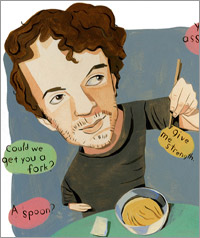
Mom always told me not to talk with my mouth full. But that's just what Leite's Culinaria wants local food writers to do for a project about food writing. Launched last year in New York City, now spreading around the country, "Talking With Your Mouth Full" is a night of reading by food writers "to highlight the versatility of the craft."
Contact for Seattle is Kathleen Flinn, author of the soon-to-be-published memoir of a year at the Cordon Bleu in Paris: The Sharper Your Knife, the Less You Cry. (Great title!)
The reading itself, at Hugo House, isn't until November, but the deadline for submissions is June 1. Check out the inaugural New York event this past January, then send in your flavorful musings.
And while we're at it, should mention that Leite's Culinaria was the online winner for the James Beard food writing awards. Seattle P-I's Rebekah Denn won for restaurant reviews (Bravo, Rebekah!). John Sundstrom of Lark was named best chef in the Northwest (Bravo, John!).
May 10, 2007
20 cents a day
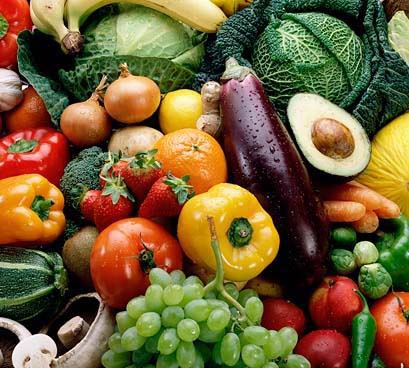
Six bucks a month, that's the budget for fruit and vegetables under the proposed new Farm Bill. Two thin dimes a day for apples and carrots.
And that's NOT the problem. Actually, it's a huge step forward, beyond funding traditional, subsidized commodities like beef, eggs or cheese. The problem is, it's not cash or food stamps that mom or gran can actually spend at the farmer's market, it's a "credit."
So who takes those "credits"? Why, big supermarket chains, natch. A noble vision that should benefit local farmers ends up favoring industrial agriculture. Yuk.
May 9, 2007
Dammed to be wild
How to save our wild salmon? Hundreds of high-profile foodies from around the country are in Washington, DC, this week lobbying for legislation that would protect the fish and restore sustainable wild salmon fisheries. Trouble is, they're running into Doc Hastings, the crusty congressman from Washington's 4th District.
The fishermen and their allies want to breach four dams on the Snake River to let the wild salmon swim upstream unharmed by power turbines. Hastings--whose constituents include ag interests that depend on irrigation from those dams--argues that breaching the dams wouldn't work.
Can see the divide forming already. Fish on the left, crops on the right.
Hastings, who chaired the House Ethics Committee when Republicans were in the majority, has lots of practice hewing to the party line, which is pretty clear: the Bush administration is going to do as little as possible to support the endangered salmon runs. Can there be a compromise? Can't we update the old song from Oklahoma: "Oh, the farmer and the salmon should be friends!"
And while we're on the subject of wild salmon, Charles Ramseyer's restaurant by that name has opened in New York to some strong reviews.
May 8, 2007
Eat me??
Comes word that Washington's hatchery fish have been fed some of that tainted Fido-food. FDA's doing a heck of a job, right?
Sure, there are more important things to worry about: imaginary gluten sensitivity, the cascading Sallie Mae scandals, the about-to-climax Wolfowitz drama, even Paris Hilton's prison hairdo. Poor Paris, victim of her own self-absorbed conduct. With or without a new publicist, she's probably going to do hard time. Would that various & assorted political appointees faced the same fate.
May 7, 2007
Grand Opera in Grand Rapids

As the house lights dim at the DeVos Performance Hall and the solemn opening chords foreshadow his fate, Don Giovanni is onstage caressing an all-too-willing Donna Anna. And here, before the first word is sung, is the key to the opera: is Giovanni a criminal rapist (whom we must surely condemn) or a suave if amoral seducer (whom we can reluctantly admire)?
Matthew Lata's staging--like Seattle's, in January--seems to favor seduction. Yet the Don--abetted by Leperello--callously slits the Commendatore's throat when he comes to his daughter's defense. Now we're into the realm of film noir: a leading character of dubious morality, a story updated to Seville in 1936, and a setting full of shadows and shifting shapes.
In the Opera Grand Rapids production, Christopher Schaldenbrand makes Giovanni a convincing, masculine force who lives life (and goes to his doom) according to a personal code of honor. As in Seattle, he is surrounded by compromisers: the jilted Donna Elvira still loves him, Donna Anna never admits that her lust caused her father's death, Don Ottavio waits like a schmuck for her grieving to end (and has two of the night's best arias along the way), Leperello steals his master's food. Only Zerlina, the savvy, sexy peasant girl, seems to have the right notion of situational ethics, as do her counterparts in Mozart operas generally.
Though the production was well sung, inventively staged and impressively lit, Grand Rapids isn't really opera country. The DeVos and Van Andel families--founders of Amway--have underwritten the major athletic and cultural facilities in Grand Rapids; that's not a bad thing: the concert hall is a jewel of a theater. And if, three weekends of the year, the house stages grand opera, that's all to the good.
May 6, 2007
Klompen through the tulips
Readers Digest calls Tulip Time, here in Holland, Mich., the nation's top small-town festival. It's a week-long celebration of the region's Dutch heritage, not a Cinco de Mayo reference in sight.
Some 1,400 Klompen dancers, mostly high school girls, spend weeks learning the routines for the European-style folk dances. They pull on heavy socks and home-made costumes (patterned after traditional Dutch garb), slip into their clogs and stomp their way through some 50 performances. Parades, too: the governor leads one of them, wielding a broom to sweep the streets clean.
As for the tulips themselves, well, they line the streets of Holland in well-kept beds, and there's a 40-acre field on the outskirts of town. By comparison, the Skagit Valley Tulip Festival, which closed at the end of April, offered visitors over 300 acres of blooms, but no dancing.
May 5, 2007
Yes, there's wine in Michigan
And why wouldn't there be? Bowers Harbor Vineyards, on the shores of Lake Michigan, is right on the 45th parallel, just like Oregon's Willamette Valley, the northern Rhone in France, Italy's Veneto.
Enjoyed a glass of Bowers Harbor pinot grigio with a risotto of artichokes and spinach at Marco, a decidedly European café just outside Grand Rapids. Eat local, drink local! Not expensive, either.
May 4, 2007
Supermarket warrior
Donna Giordano, a 25-year veteran of the of the grocery wars, has a lot to say about what's for dinner. As president of QFC, she runs 77 supermarkets in Washington and Oregon. But QFC is part of the giant Kroger Corp, and only a tiny part at that, so she has to convince the bean counters back in Cincinnati that Seattle shoppers care about quality.
The newest QFC, which opened this week at 5th and Mercer on Lower Queen Anne, is more than twice the size of the old store in the no-man's land behind Key Arena. Same footprint as the 6-month-old Whole Foods, less than a mile away at Westlake and Denny, though QFC runs leaner (half the employees). But they both have all the accoutrements of upscale soops: flowers, bistro, displays of fresh fish, on-site sushi makers, a wine steward, a cheese expert. Whole Foods built its reputation on organic; QFC integrates a generous selection of organic produce and "natural" foods throughout the store.
Parent company Kroger is almost unbelievably huge: 2,500 supermarkets under 24 banners (including Fred Meyer, which targets what marketers like to call "value-driven" shoppers), $66 billion in sales, 300,000 employees. Giordano marshalls QFC's 5,500 employees as an autonomous division, targeting Seattle's unique upscale consumers.
Ironically, as supermarkets reinvent themselves to imitate experience of shopping at the Pike Place Market, increasing numbers of foodies are shopping at Seattle's six neighborhood farmers markets, reopening this month.
Giordano isn't worried. "Seattle is a foodie city," she says.
May 2, 2007
Eat me?
The Fido-fodder scandal is spreading. Now it's tainted poultry in Indiana, chickens laced with melamine originally sold as pet food and "salvaged" as chicken feed. (Goldy of HorsesAss.org, who's really been on top of this, has more over at the Slog.)
Like the contaminated spinach scare last year, the story has everything, including a vague, ominous threat (adulterated food supplies), cute, innocent victims (Fido, Fluffy), and an amorphous, unknown villain (The Chinese? Greedy American capitalists? Our own government?)
RobertInSeattle added a great comment to Cornichon's original post a couple of days ago: don't automatically blame the Chinese, he says; consider the possibility that American buyers of contaminated feed were aware of what was going on.
So where's the FDA as this menace moves from dog dish in the general direction of our own dinner plates? Aren't they ones who are supposedly protecting the food supply? Well, they just got around to appointing a Food Safety Czar.
Dispatch calling all czars, this is dispatch, come in please: AIDS czar, Iraq war czar, drug czar, food czar ...
Whew, we feel a lot safer now.
May 1, 2007
We iz poopn in ur spinach
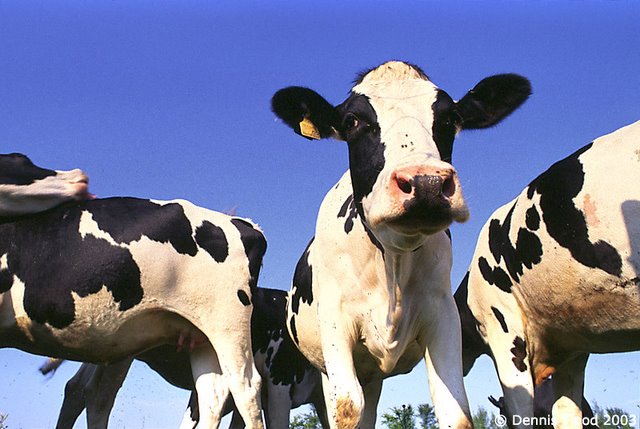
U feedz us grain. Better dan cheezburger but we wantz grass, not grain cuz grain makes us sick. U feedz us meds but meds put more ecoli in our poop. All dat poop! Ecoli poop everywhere! In da spinach even. Plz feedz us grass so we dont poop nasty poop in ur spinach.
